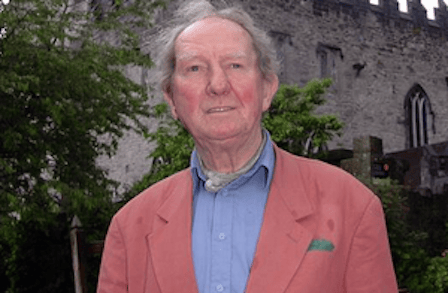Gabriel Fitzmaurice
Questioning Ireland: Essays and Reviews,
by Thomas McCarthy
(Gallery Books, €17.50 / £14.50)
Thomas McCarthy’s latest book, Questioning Ireland, is, like its predecessor, Poetry, Memory and the Party, magnificent. McCarthy, poet, novelist, essayist and critic is at once a Waterford man, a Munster man, an Irishman and a man of the world.
A fine poet and critic, he casts a clear and loving eye on poetry and other literary works as well as film and the visual arts in this collection of essays and reviews, reprinted from such varied sources as The Irish Times, Poetry Ireland Review, Poetry and PN Review, a gathering of fifty years’ work.
Substantial
In substantial sections that deal with “the Irish Question” from the poet-dreamers of 1916 to the Celtic Tiger and beyond, an Ireland he proposes that “must continue to be a task for great journalism as well as a source for poetry”; the Anglo-Irish Ascendency, its Big Houses, Molly Keane and Elizabeth Bowen, “two great Anglo-Irish novelists tossed ashore by the receding waves of Anglo-Ireland just as Irish Nationalism achieved its great victory of an independent State”; and the Ulster Question with its politics and poetry, its Paulin and Longley and Carson, its Heaney and Hewitt, MacNeice, Montague, Mahon, McGuckian and Muldoon, his knowledge of Irish culture, particularly poetry, is unrivalled.
A champion of women’s writing long before it was popular or profitable, his essays on Eavan Boland, Nuala Ní Dhomhnaill, Annamarie Ní Churreáin, Sara Berkeley and others who are now household names are lucid as they are perceptive.
A Waterford man living in Cork, he celebrates his adopted city remembering the fiery and troublesome artist James Barry, a native of Water Lane, now Redemption Road, born in 1741, died 1806, whose art, McCarthy contends, is “as European as anything by David and as vulnerable as anything by James Joyce”; the great Cork circle around Fraser’s Magazine that was published in London from 1830 to 1882 and included Crofton Croker, Francis Sylvester Mahony, aka Father Prout, and others; twentieth century poets including Sean Ó Ríordáin, Sean Dunne and Theo Dorgan; Gerald Y Goldberg, Lionel Cohen and the Cork Jewish community; and Frank O’Connor who, though for instance, a visiting professor at Stanford University teaching students like Ken Kesey, remained a disciple of Daniel Corkery and Turgenev, and who wrote with “the trenchant eagerness of a master”.
Further afield, his readings of Heaney, Montague, Hartnett and Michael D. Higgins, to mention but a few, are brilliant and generous.
Overdue
In a welcome, and overdue, tribute to Desmond O’Grady and Federico Fellini, he reminds us that O’Grady, the Irish poet in La Dolce Vita, was at the centre of high European Cinema at a time when Irish men and women were “the talking fools of Disney’s Darby O’Gill” or in later times “the violent, drunken mobsters, thugs and robbers … of British and American cinema”, and, later still, terrorists.
McCarthy’s essays are intelligent and intelligible, lighting our way into his world of language and literature, celebrating the wholesome and the worthwhile.
In considering the great he is munificent in his praise. In rescuing the neglected or in introducing the reader to some lesser known poets whose voices are too often drowned in the cacophony of contemporary po-business, McCarthy has done the art some service.
Like the late, lamented John Jordan of whom he writes so affectionately, McCarthy’s voice is clear and beautiful. Questioning Ireland shows him to be that rarest of treasures, a generous and discerning reader, a true man of letters.


